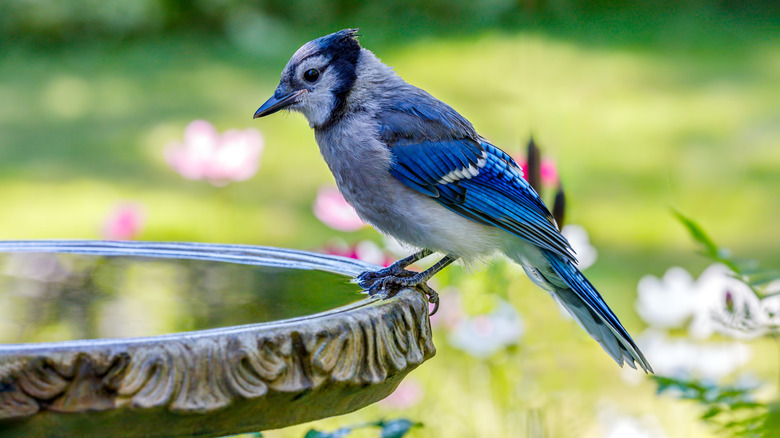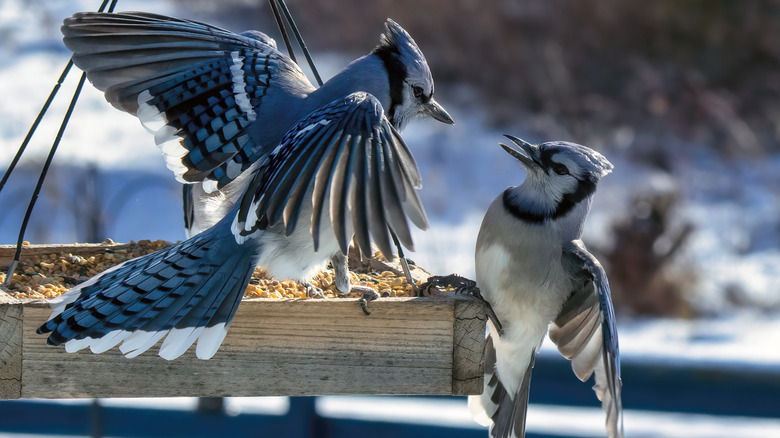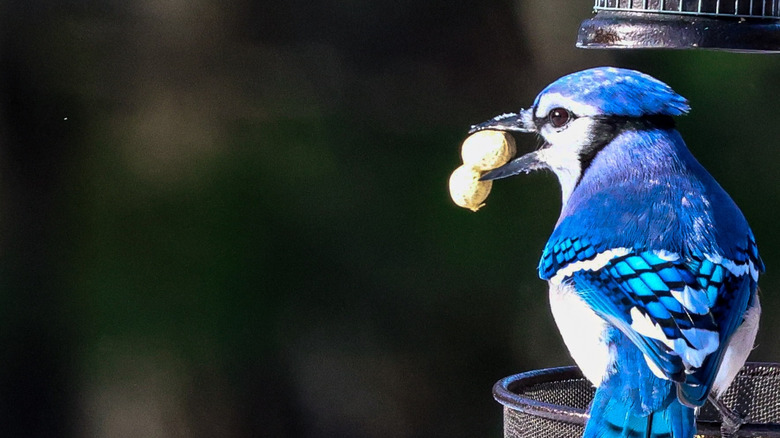Blue Jays Aren't A Bird You Want To See In Your Yard. Here's Why
That bright and vocal blue jay has been a lightning rod of controversy among birders for decades. Some love the bird, many others hate it, but almost everyone has an opinion about them. Still, there are a few good reasons why you might not want to see blue jays flying around your yard. For starters, they can be aggressive towards other birds.
The incredibly adaptable blue jay belongs to the super intelligent Corvidae family of crows and ravens. Blue jays use their smarts to thrive alongside humans and are often the first bird to find your bird feeder. They're boisterous and loud, and are known for their uncanny ability to mimic the cry of a red-shouldered hawk. Predatory raptors are known to prey on birds, can be a whole other problem at the bird feeder — but you can learn how to get rid of hawks in your yard with a few proven strategies.
Blue jays, of course, are known for their bright blue feathers, but you might be surprised to learn that their feathers aren't actually blue. They're a boring brown. The feathers have special cells that reflect light like a prism, and so our eyes see blue even though there's no actual blue pigment there. While they are pretty and fascinating birds, some people don't like blue jays since they're noisy and can scare off other birds from your yard.
Blue jays can be aggressive to other birds
Some birdwatchers say blue jays are bullies, especially at bird feeders, and are known to crowd out other songbirds. Blue jays can dominate a feeder and devour everything in it before other smaller birds get a chance to feed. Only a few other bird species can compete with them at the feeder, such as the hairy woodpecker.
If you've been considering setting up a home for the boisterous birds, and asking yourself how to build a bird house for blue jays, you might want to think twice — they can be territorial around their nests. Blue jays will dive bomb anything that gets near it. If you get a bunch of them together, they will join forces to attack anything they see as a threat. They might not stop at jeering or bullying, either.
Blue jays occasionally do raid other birds' nests and eat eggs and young hatchlings. This threat often is overstated, however, since this usually only happens when their preferred sources of food are scarce. Bird eggs and hatchlings aren't their first choice, as they'd typically rather snack on acorns. Other songbirds are well aware of the threat of blue jays, which is why during nesting season they'll attack the birds out of an abundance of caution. Blue jays have been known to prey on other adult birds as well, especially those already injured. So what to do about the troublemaker blue jay?
Keep the peace with blue jays in your yard
While blue jays can cause trouble, they're beneficial birds as well. They've been the bad guys in the yard since John James Audubon, a bird painter of the 18th century, famously threw shade at the species. If his name is familiar, that's because the bird conservation group National Audubon Society is named for him. But blue jays do good as well. Their squawks alert fellow songbirds to the possibility of a hawk or other predators. And their love of acorns means they help spread tree seeds far and wide.
It's difficult to deter blue jays from the yard without also affecting other songbirds as well. Shiny, reflective spinners or household pets like dogs and cats can scare off blue jays, but they'll discourage other birds from coming to your yard, too. The best course of action is likely to give the blue jays their own feeder. The less competition for seeds, the better.
Add whole peanuts or sunflower seeds to a separate feeder — a hopper or platform will work best — and blue jays will flock to it. The birds like to swoop in for peanuts, shell and all, and won't stop until all the peanuts are gone. Of course, squirrels, another bird feeder bully, also love peanuts, so you may find they're competing with the blue jays for them. Try using cinnamon, a common spice that's the trick to keeping squirrels off of your bird feeder.


